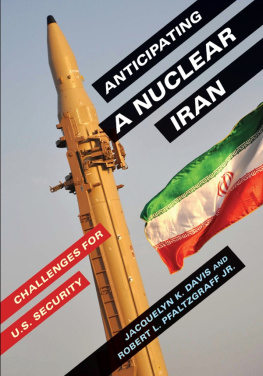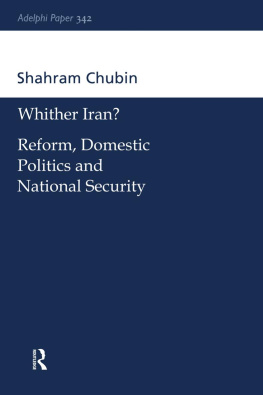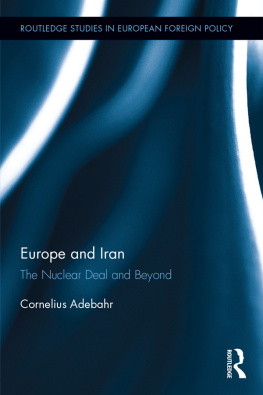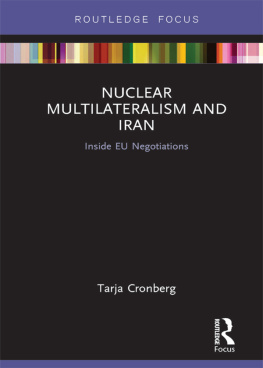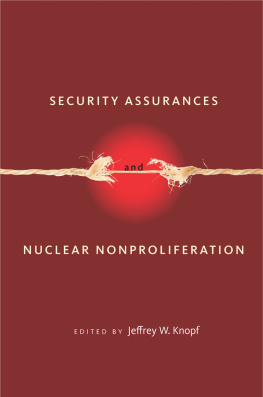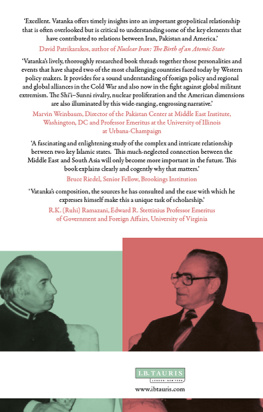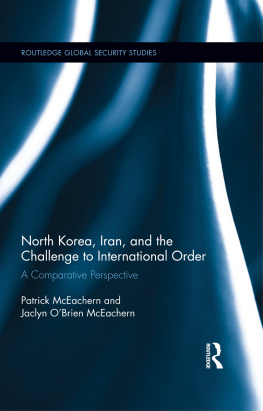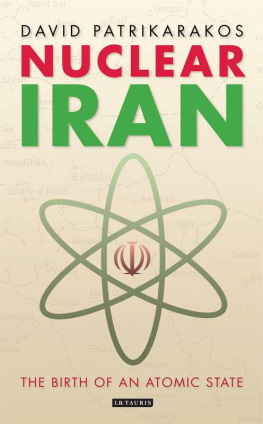Anticipating a Nuclear Iran
Anticipating a Nuclear Iran
CHALLENGES FOR U.S. SECURITY
Jacquelyn K. Davis and Robert L. Pfaltzgraff Jr.
Columbia University Press New York
Columbia University Press
Publishers Since 1893
New York Chichester, West Sussex
cup.columbia.edu
Copyright 2014 Columbia University Press
All rights reserved
E-ISBN 978-0-231-53594-6
Library of Congress Cataloging-in-Publication Data
Davis, Jacquelyn K.
Anticipating a nuclear Iran: challenges for U.S. security / Jacquelyn K. Davis and Robert L. Pfaltzgraff Jr.
pages cm
Includes bibliographical references and index.
ISBN 978-0-231-16622-5 (cloth : alk. paper)ISBN 978-0-231-53594-6 (e-book)
1. Nuclear weaponsIran. 2. IranMilitary policy. 3. IranPolitics and government1997 4. IranForeign relations1997 5. United StatesRelationsIran. 6. United StatesMilitary policy. 7. Deterrence (Strategy) 8. Security, International. I. Pfaltzgraff, Robert L. II. Title.
UA853.17D38 2013
355.02'170955dc23
2013016815
A Columbia University Press E-book.
CUP would be pleased to hear about your reading experience with this e-book at .
Jacket design by Noah Arlow
References to websites (URLs) were accurate at the time of writing. Neither the author nor Columbia University Press is responsible for URLs that may have expired or changed since the manuscript was prepared.
Two things, I confess, have staggered me, after long Parliamentary experience, in these debates. The first has been the dangers that have so swiftly come upon us in a few years, and have been transforming our position and the whole outlook of the world. Secondly, I have been staggered by the failure of the House of Commons to react effectively against those dangers. That, I am bound to say, I never expected. I never would have believed that we would have been allowed to go on getting into this plight, month by month and year by year, and that even the Governments own confessions of error would have produced no concentration of Parliamentary opinion and force capable of lifting our efforts to the level of emergency.
Sir Winston Churchill, November 1936, Remarks in the House of Commons
CONTENTS
This book is the product of several years of research and analysis, based on primary and secondary sources, interviews, focused workshops, and seminars. We benefited from the insights and ideas of many people, including members of the Institute for Foreign Policy Analysiss international board of research consultants and discussions with key leaders in the United States and allied/partner national security community. We wish to thank them all.
The idea for this book grew out of a project that was funded by the Smith Richardson Foundation. We owe a debt of gratitude to the foundation for supporting the initial work, without which this book would not have been possible. In particular, we wish to thank Dr. Marin Strmecki and Dr. Nadia Schadlow for their sustained encouragement and support, together with the Board of the Smith Richardson Foundation for having granted us the opportunity to explore the implications of a nuclear Iran for U.S. security planning.
We also wish to acknowledge our colleague, Dr. Charles Perry, at the Institute for Foreign Policy Analysis (IFPA) for his comments and ideas as we worked through subsequent drafts of this manuscript, as well as Professor Richard Shultz at the Fletcher School, Tufts University. We also want to thank and recognize Ilan Berman, Professor Paul Bracken, Michael Eisenstadt, Ambassador Robert Joseph, and Dr. Keith Payne for their insightful comments and suggestions on various drafts of this manuscript.
Last but not least, we owe thanks to Polly Parke for administrative support that was indispensable to this project and book, as well as to Jack Kelly and Ricky Trotman for their help in tracking down sources and to Christian Hoffman for graphics and layout.
Despite continuing international efforts to constrain or halt Irans programs, there is growing evidence that Iran is determined to become a nuclear weapons state. If this cannot be prevented, or if it can be only postponed, the United States and other nations will face the need to coexist with a nuclear-armed Iran and to contemplate the consequences of this situation for U.S. and allied/partner defense and deterrence planning. It is widely assumed that an Iran with nuclear weapons would threaten stability in the politically fragile and potentially explosive Middle East. It would also challenge the legitimacy of the international nonproliferation order established in the second half of the twentieth century and codified by the Nuclear Non-Proliferation Treaty. If we cannot dissuade Iran from becoming a nuclear weapons state, can we live with it? If so, how? Would a nuclear Iran be deterrable, and are its leaders rational actors when it comes to calculations pertaining to crisis management and escalation control? Would the possession of nuclear weapons embolden Irans foreign policy decisions, or would it serve as a defensive shield to protect Irans vital interests? Answers to such questions may possibly be found in the way in which Iran goes about its nuclear development as well as speculation about alternative Iranian nuclear futures.
Just as important, however, might be an Iranian assumption that Iran would benefit politically from the overt deployment of nuclear weapons capability, particularly as it relates to regional political dynamics and its self-proclaimed leadership role on the international stage. In this respect, nuclear weapons quite possibly could embolden Irans leadership in its conduct of foreign policy, providing a basis for taking risks that the countrys leaders might otherwise not elect to assume. At the same time, Irans possession of nuclear weapons might also ameliorate domestic opposition to the regime. Diverting public attention from difficult domestic challenges at a time when the regime faces increased criticism at home would create an opportunity to channel public discontent and anger away from domestic problems, allowing Irans leaders to highlight Tehrans new international status.
Alternatively, Iran could adopt a stance of nuclear ambiguity, neither affirming nor denying a nuclear weapons capability based on a highly secret program that moved Tehran steadily toward the nuclear weaponization threshold. In this sense, Iran could adopt the Israeli model, in which nuclear weapons would be developed clandestinely and deployed in secret locations, away from Western observation. Iran could choose to refrain from showcasing its nuclear capability, much as Israel has tried to do for so long, and plausibly deny that it had developed a nuclear deterrent capability as a means of hedging its bets with the international community. This approach would be consistent with Irans penchant for secrecy. It would also support a regime decision to protect itself against the inevitability of further Western (and UN-mandated) counter-measures that would likely be attendant upon adoption of the North Korean model. It would also provide Iran with a defensive deterrent or retaliatory capability should Iran ever be threatened with aggressive nuclear or conventional military action.
This appears to be the current Iranian approach. It is consistent with Iranian efforts to develop a sophisticated nuclear-technology base, which could be used to provide the basis for a nuclear breakout capability if and when a strategic decision to cross the nuclear threshold is taken. In the case of Japan, because that country is widely assumed to have the ability to produce and deploy nuclear weapons relatively quickly, it is said to possess so high a level of nuclear latency as to make it a virtual nuclear state. With its ongoing uranium-enrichment programs, a wide-ranging, indigenous missile-development effort, and an ambitious space-technology program, Iran may indeed be pursuing nuclear latency as the means to achieve its political and strategic objectives without breeching its NPT obligations. In the final analysis, the decision about whether to cross the nuclear threshold becomes a question of policy choice rather than technological capability. The necessary infrastructure and expertise are in place, ready to be activated when the political leadership decides to do so.


